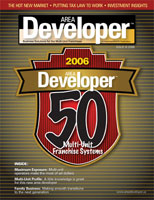Putting Your Retirement Funds to Work
Finance franchise growth through "BORSA" plans
When Mike Willett was looking for creative ways to finance the growth of his franchise plans in the Houston area, he looked no further than his existing retirement plan. With a program known as a BORSA (Business Owner's Retirement Savings Account) Plan, he recently tapped his 401(k) holdings to launch the regional development of Synergy HomeCare. The BORSA program is structured so that retirement funds can be used for business development without distributions, taxes, penalties, or loans.
Generally when individuals tap retirement funds before age 59-and-a-half, they are required to pay a hefty 10 percent penalty in addition to ordinary income tax, which is due on distributions from qualified retirement plans. But those with knowledge of how to use the Employee Retirement Income Security Act (ERISA) to accomplish retirement fund transfers for business development are helping many business owners make use of these funds. In addition to 401(k) funds, other retirement funds qualify for this type of program, including IRAs, SIMPLE plans, and SEPs.
Willett says that setting up his BORSA program was a very good way to access 401(k) money for his business plans. He anticipates good growth from his investment in the home health care industry both before and after he retires. The Bureau of Labor Statistics, for example, says the home health care industry will increase by more than 55 percent between 2002 and 2012.
Willett says his retirement funds normally would be invested in the stock market, but he hopes putting some of the funds into business development will provide a better return in the future.
He discovered the availability of this financing method from DRDA, a CPA firm in the Houston area (www.drdacpa.com). To qualify for this type of program, you must have terminated, or be about to terminate, your employment. DRDA set up the BORSA program for Willett's company for a fee of about $5,000. There also are annual maintenance fees to pay.
Other CPA firms offer similar arrangements. They include a firm considered the pioneer in this field: BeneTrend, Inc., in San Diego (www.benetrends.com). Its founder, Leonard Fischer, is an attorney specializing in ERISA. He fashioned one of the first programs allowing individuals to use retirement savings for business investments or operations. Over the past two decades, thousands of people have successfully used Benetrends to establish a funding plan.
Another firm is FranFund (www.franfund.com), which also has a plan that converts qualified retirement dollars into cash to purchase a franchise.
For Willett, DRDA took on a number of responsibilities. For example, the firm assisted in the design and preparation of the documents required to incorporate the business and ensure that it qualifies to do business in the state of incorporation. It also prepared the bylaws for the new corporation, the initial shareholder and director minutes, and obtained a federal identification number.
Willett plans to develop the Synergy model in the south Texas region, which includes Houston, Corpus Christi, Austin, and San Antonio. The franchise provides in-home non-medical care to individuals who require daily living assistance. Hourly, daily, weekly and 24/7 services are available 365 days a year to clients that include seniors; individuals afflicted with multiple sclerosis, Alzheimer's, Parkinson's, and other mobility-affecting diseases. Synergy also helps those convalescing from strokes, injuries, and surgeries; disabled children and adults; and individuals undergoing chemotherapy or battling other diseases that sap their strength.
Peter Tourian founded Synergy HomeCare in Mesa, Arizona in 2002. The company experienced rapid growth, and franchising began in 2005. Synergy currently has offices in a number of locations in Arizona, as well as in Sioux City, S.D., Bellevue, Wash., and Houston.
The estimated initial investment ranges between $42,000 and $62,000, including a $35,000 franchise fee. Franchisees pay a five percent royalty on monthly gross revenue, along with a two percent monthly contribution to a marketing fund. Exclusive territories are based on a population of 217,000.
Synergy is expected to sell up to 300 U.S. franchises within the next five years. The concept involves a small core of regional developers, who recruit, develop, and support franchisees in their designated territories. Exclusive territories are based on a population of 217,000 and are among the largest in the industry.
Tapping retirement funds
Under this funding arrangement, business owners set up a C corporation for their new business. The C corporation establishes a new retirement plan. Then the individual's current retirement funds are rolled over into the C corporation's new plan. Last, the new retirement plan invests in the stock of the C corporation.
This provides the new corporation with cash in the bank, and the plan has the stock of the corporation. When the business is generating sufficient profit, it is possible to re-fund the retirement plan. Business owners who decide to go this route must be sure to follow the rules of C corporations, including naming officers and holding annual meetings.
Willett says the process was fairly easy, and DRDA provided assistance every step of the way. "DRDA obtains the IRS determination letter, which says that you have a valid employer-sponsored plan and shows you how to self-direct the proceeds that you deposit into your BORSA," he says.
This arrangement is not without risk, he points out. "You are basically directing your 401(k) or retirement money into a new business," he says. "But individuals should weigh that risk against how business-savvy they are, how much confidence they have in their business plan, and what kind of return they think they will get out of the stock market," says Willett.
Once the plan has been approved by the IRS, it is considered an IRS-approved qualified retirement plan similar to retirement plans set up by employers, which makes it subject to the same administration, accounting, and reporting requirements as other plans. The IRS reviews and judges each plan individually and has issued thousands of favorable determination letters for such plans.
Because franchise development can involve a large investment, it is important that investors perform sufficient due diligence. "Clearly there is risk with any kind of investment," says Willett. But he did a good deal of research and due diligence over many months before taking the plunge. Any good business owner would do the same, he says.
Share this Feature
Recommended Reading:
FRANCHISE TOPICS
- Multi-Unit Franchising
- Get Started in Franchising
- Franchise Growth
- Franchise Operations
- Open New Units
- Franchise Leadership
- Franchise Marketing
- Technology
- Franchise Law
- Franchise Awards
- Franchise Rankings
- Franchise Trends
- Franchise Development
- Featured Franchise Stories
FEATURED IN

Multi-Unit Franchisee Magazine: Issue 3, 2006

$500,000
$50,000





 The multi-unit franchise opportunities listed above are not related to or endorsed by Multi-Unit Franchisee or Franchise Update Media Group. We are not engaged in, supporting, or endorsing any specific franchise, business opportunity, company or individual. No statement in this site is to be construed as a recommendation. We encourage prospective franchise buyers to perform extensive due diligence when considering a franchise opportunity.
The multi-unit franchise opportunities listed above are not related to or endorsed by Multi-Unit Franchisee or Franchise Update Media Group. We are not engaged in, supporting, or endorsing any specific franchise, business opportunity, company or individual. No statement in this site is to be construed as a recommendation. We encourage prospective franchise buyers to perform extensive due diligence when considering a franchise opportunity.